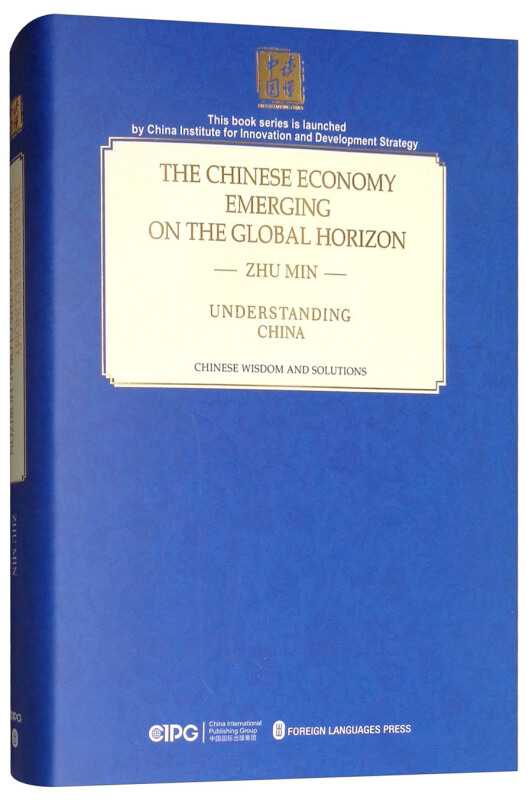
中国经济:崛起在世界的地平线:英文

温馨提示:5折以下图书主要为出版社尾货,大部分为全新(有塑封/无塑封),个别图书品相8-9成新、切口有划线标记、光盘等附件不全详细品相说明>>
- ISBN:9787119116273
- 装帧:一般胶版纸
- 册数:暂无
- 重量:暂无
- 开本:25cm
- 页数:415页
- 出版时间:2018-10-01
- 条形码:9787119116273 ; 978-7-119-11627-3
本书特色
改革开放以来,中国经济持续调整发展,目前已是全球第二大经济体,中国的宏观经济金融政策通过贸易、投资、资金流动、市场信心也影响全球的经济增长、投资、就业、通货膨胀预期,以及全球资本市场的波动。朱民著的《中国经济(崛起在世界的地平线英文版)(精)》正是从全球视野讨论中国经济在世界经济中的地位以及对世界经济的影响。由此讨论中国和世界经济金融的合作以及中国参与国际经济金融治理机制和共建全球经济金融新秩序。
内容简介
In 1978 China embarked upon its journey of economic reform and opening up, and ever since its economy has exhibited unprecedented dynamism and vit.ality. In less than 40 years, China has transformed itself from an impoverished third-world country playing a minor role in the global economy into the world's second-largest economy, biggest t.rader in goods and top manufacturing powerhouse. With such awe-inspiring achievements, China's economy today is rising on the horizon, with unlimited prospects ahead.
目录
Chapter 1 China's Economy: Soaring Dragon and Leaping Tiger
Section I Reform and Development of the Rural Economy: A Great Experiment of 800 Million Farmers
Section II Reform and Development of the Industrial Economy: From a Centrally Planned to a Market-Driven System
Section III Reform and Development of Foreign Trade: From Isolation to World No. 1
Chapter 2 China's Financial System: A Miracle Starting from Scratch
Section I Creating a Financial System from Scratch
Section II A Flourishing Financial Market
Section III Explosive Growth of "Digital Finance" in China
Section IV China's Financial Sector "Goes Global"
Section V Experience and Outlook of China's Financial Reforms
……
Chapter 3 Bright New Lives and Social Outlook
Chapter 4 China's Responsible Key Role in the International Community
Chapter 5 China's Economy Shocks the World
Afterword
节选
《中国经济:崛起在世界的地平线(英文 精装版)》: 2. From planning to separation of powers: foreign-trade system reforms 1979-1986 The reform of China's foreign-trade system was primarily aimed to change the highly centralized management system and the mandatory planning management system, delegate foreign-trading powers to lower levels, and introduce a combination of mandatory plans, guiding plans, and market regulations. Specific reform measures included: (1) Adjusting the leadership structure: In 1979, the Chinese government established the Import and Export Administration Committee, which supervised the MFT. In Mafch 1982, realizing that the two institutions had ovedapping authority and duplicated work, the Chinese government merged them, alongside the Ministry of Economic Relations with Foreign Countries and the Foreign Investment Committee, to form the Ministry of Foreign Trade and Economic Cooperation (MFTEC). The new ministry was responsible for administering foreign trade nationwide. (2) Breaking the monopoly of foreign-trade departments over foreign trade: The State Council permitted ministries in selected productive sectors to establish import and export corporauons special_izing in foreign trade related to their sector. In the case of the Ministry of Machinery, by June 1984, it had established 23 corporations, including the China Machinery and Equipment Import and Export Corporation and the China Agricultural Machinery United Import and Export Corporauon. The monopoly of the foreign-trade departments over foreign trade was thus broken. (3) Expanding local rights to deal in foreign trade: In July 1979, the Chinese government introduced special policies and flexible measures for foreign-related economic activities in Guangdong and Fujian provinces. In January 1982, the CPC Central Committee released the minutes of the Conference on Foreign Trade in Nine Coastal Provinces, resolving to expand foreign-tfade fightS at the local level. The import and export of all goods, except those monopolized by the state, were to be managed at the locallevel. The state would only issue quotas for foreign-exchange earnings from exports, and all provinces were allowed to retain surplus earnings after fulfilling their quotas. This inspired strong enthusiasm for foreign trade at the local level. (4) Defining the division of responsibility between central and local governments: Bulk imports and the import of goods with a strong monopolistic nature in the international market were to be handled by specialized foreign-trading companies affiliated with the MFTEC, and under special cifcumstances, goods for self-consumption could be imported with the approval of imports distribution corporations. Moreover, local governments could import goods, except those handled by specialized foreign-trading corporations, with their retained foreign-exchange earnings or self-raised foreign exchange. ……
作者简介
朱民,is the current President of Tsinghua Unversity's National Institute of Financial Research and Executive Director of the Board of' the World Economic Forum. Zhu was Deputy Managing Director of the International Monetary Fund from July 2011 to July 2016. Prior to that, he was Deputy Governor of the People's Bank of China and Vice-President of the Bank of China. He also worked at the World Bank and taught economics at Johns Hopkins University and Fudan University. Zhu received a BA in economics from Fudan University, an MPA from Princeton University's Woodrow Wilson School of Public and International Affairs, and an MA and PhD in economics from Johns Hopkins University. His awards include the 2014 China Economic Personage of the Year, the 2015 You Bring Charm to the World Award, ancl the 2016 CFV 10-Year Prominent Global Financial Figures Award.
-

国富论
¥8.8¥35.0 -

曾国藩的经济课
¥26.5¥68.0 -

博弈论
¥10.0¥38.0 -

看得懂的经济学-哈佛教授最受欢迎的经济学课
¥19.7¥58.0 -

斯密评传
¥14.4¥45.0 -

图解资本论
¥12.2¥46.0 -

经济学通俗读物:北大经济课(受益一生的经济学智慧)
¥11.6¥35.0 -

1949-2009-八次危机-中国的真实经验
¥31.9¥55.0 -

元代榷盐与社会(2009/8)
¥9.9¥30.0 -

资本论
¥27.5¥59.8 -

博弈论
¥25.9¥49.8 -

财富从哪来
¥23.4¥65.0 -

中世纪商业合伙史
¥16.7¥49.0 -

经济学通识-第二版
¥20.3¥58.0 -

日本的反省-走向没落的经济大国
¥12.6¥35.0 -

思考.快与慢
¥50.4¥69.0 -

行为经济学要义
¥28.3¥59.0 -

星际迷航经济学 科幻、经济学和未来世界
¥20.0¥49.8 -

英国的经济组织
¥16.9¥18.0 -

1965-2005-美国外来移民的劳动力市场与经济影响
¥22.0¥58.0











